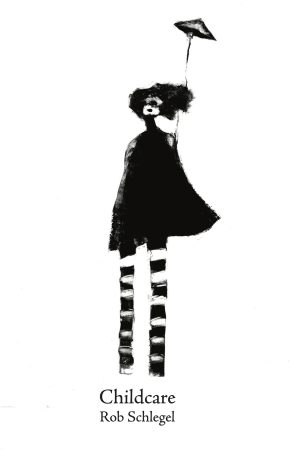
paper • 76 pages • 17.95
ISBN: 978-1-954245-56-3
eISBN: 978-1-954245-57-0
March 2023 • Poetry
Received a starred review from Publishers Weekly
Crackling with the hypervigilance of parenthood, Childcare explores the paradox at the root of raising kids: the joy of new life accompanies an awareness of potential loss. Rob Schlegel’s fourth collection observes the tangled emotions of fatherhood; even as he wonders at the strange intelligence of youth, he elegizes the present moment. The longitudinal wisdom of this collection appears in the choreography of its leaps — how it moves from the aside “[My son] needs my love the most when he least deserves it / Is something I read” to the reflection that “Death / Names my shape. I keep my clothes / From dust and ghosts and time. / I’m angry at my father for aging.” From Schlegel’s relentless curiosity and keen observations, the artistic crisis driving the book emerges: does poetry memorialize the ephemeral moment, saving something for us, or does it remove us from experience? The duality of language’s role — that it, ultimately, has the capacity to do both — doubles the significance of “childcare” in this collection, which comes to represent not just the work of child rearing but the dutiful care by adult children for their parents. Perhaps nothing can convey the scope and quality of family life like the concatenated dependencies of “(Un)conditional,” which terminate here: “If the cut draws blood / If life ends in desire // If it begins in love.”
Is pointless, my son says. If you write that down
I’ll kill you. I fear he fears
The attention I give it. I used to drive
Till he fell asleep. Ten minutes, then silence
The river knit with ice. In tonight’s movie
A boat swerves against bullets.
He sings the movie’s theme. I kill you,
You kill me. Plot against all
That is good. Good for whom?
I know every word that rhymes
With my assailant’s first name.
It’s difficult to achieve real-world fear
In a movie. My son crawls into bed.
There’s nothing I need more than you, I say.
Not true, he says. The rudder turns
In my throat. Every sleep he needs me less.
There are few poets whose work I admire as much as I admire Rob Schlegel’s. There’s a nervy sincerity at work, a genuine desire to say what’s true—a role for the poet that emerges from the role of the parent. This voice combines the elemental depth of the fable and the immediacy of the interior monologue. These poems are as brave in their performances as they are profound in their claims: even the truest statements in Childcare seem to disappear as soon as they arrive, showing Schlegel to be the rarest of American artists, daring enough to test his wisdom against the honest brutality of everyday life. Schlegel does nothing short of renewing the power of American English to tell truths worth telling. He asks questions worth asking; he pushes the power of the language just a little bit further than we ever thought it would go, reminding us not just who we are but who we might become.
I will never forget the moment, years ago, when I was sitting at my desk in Missoula and looked out the window to see, standing in my yard, Rob Schlegel holding out to me a large yellow fruit. He appeared an apparition. I think it was a grapefruit. I say remember, but I feel remembered by it, and by the look of wonder on Rob’s face, because that is the experience, for me, of reading Childcare: of being invited into the unexpected, often disarming, always arresting presence of his attention and his discoveries, and being inspired, by them, to get up, break the window, and seek out, for myself and the people I love, my own indelible fruit.